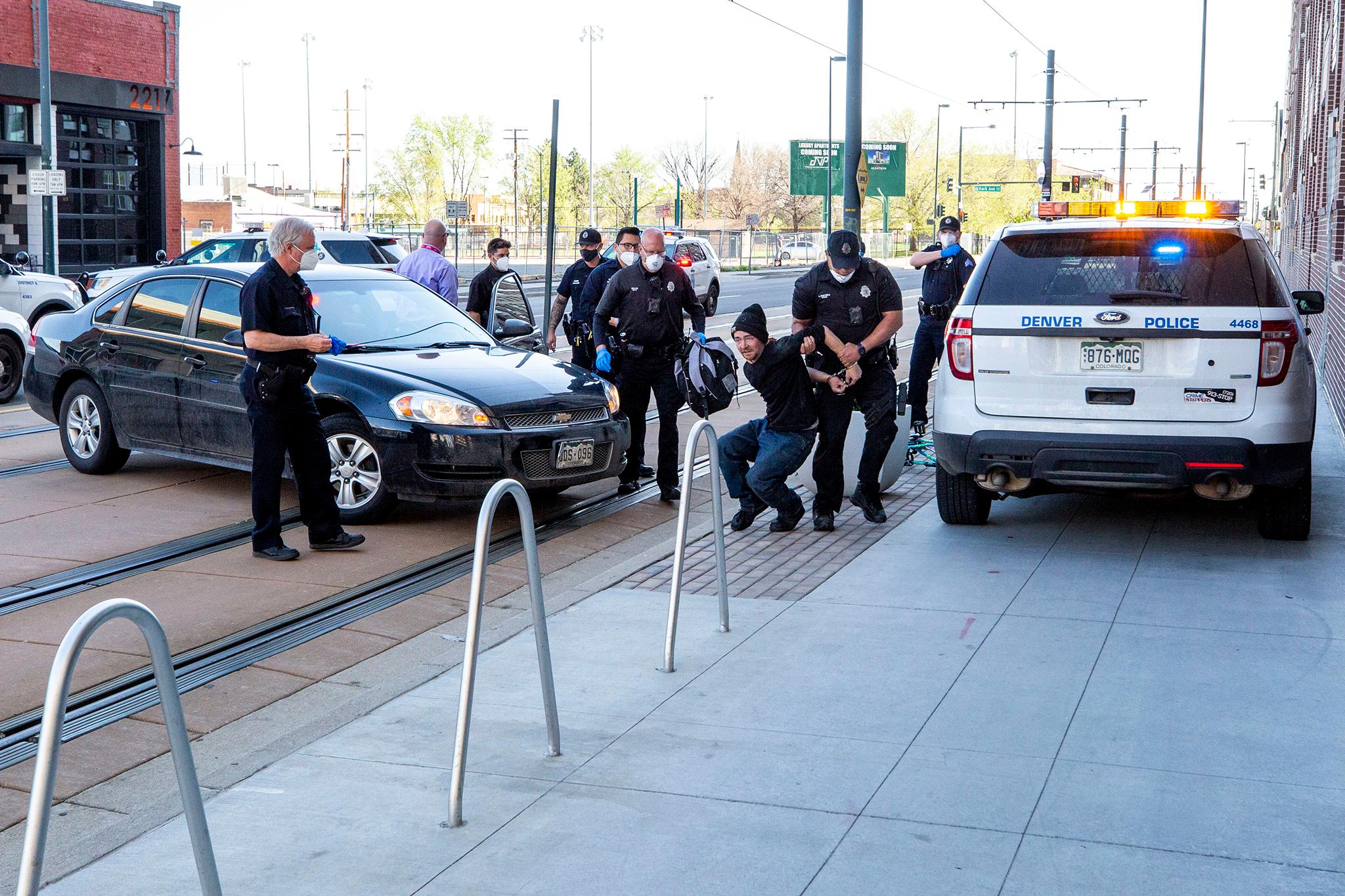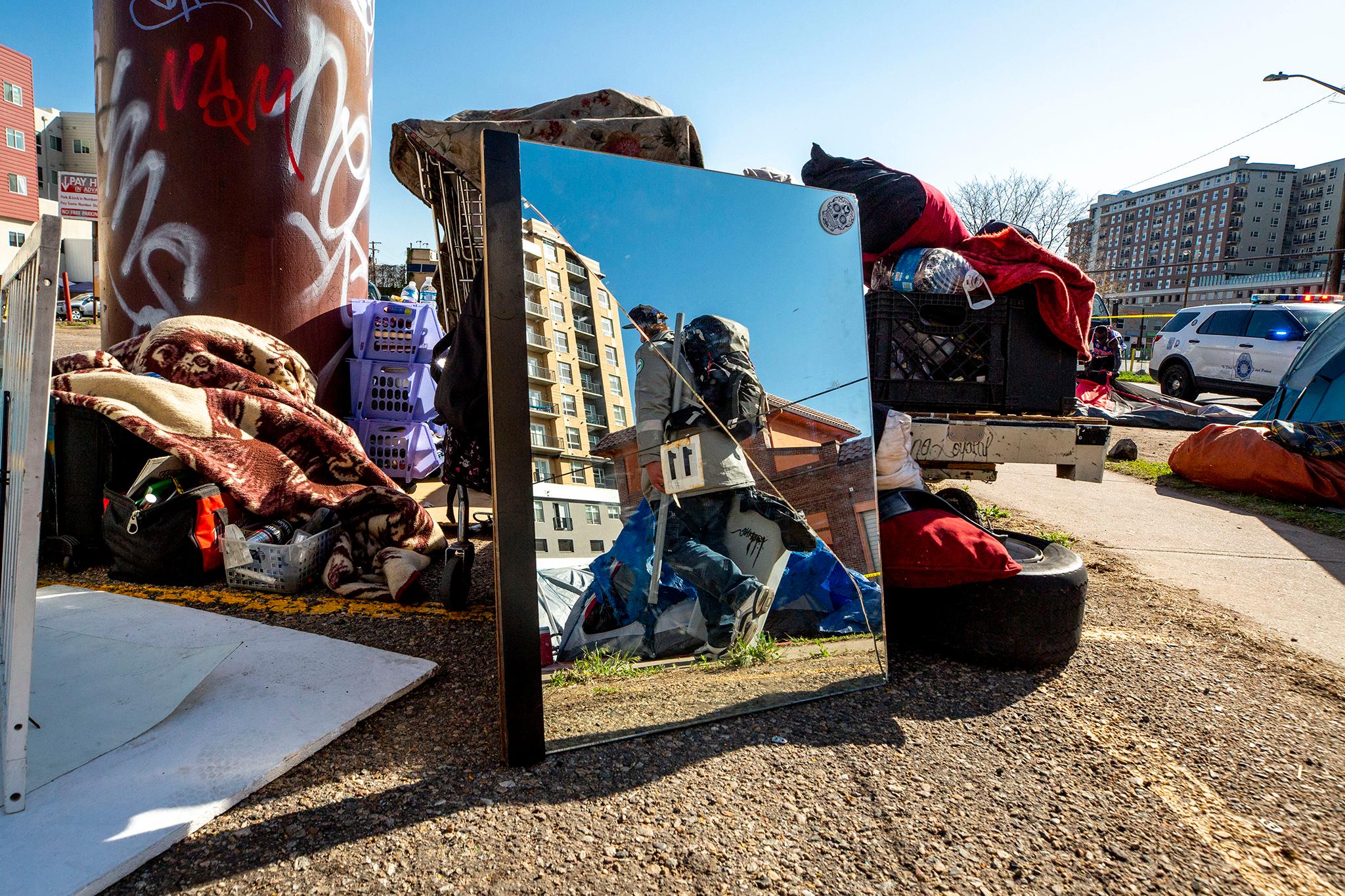When city cleanup crews moved into an area of Five Points last week, John John Nice moved out of their way, setting up camp a few blocks south along Glenarm Place.
On Thursday, the crews were back to the north of his tent. While Nice wasn't being asked to move this time, he expected he would be soon. He said he tried to keep his site neat but worried that others campers nearby who aren't so scrupulous would draw complaints.
"I'm still looking for the next place," Nice said. "I tell you what, it's going to be by myself."
Last week, Denver Department of Transportation and Infrastructure crews removed about 9,500 pounds of trash, including needles and propane in various sized cylinders, from a rectangle of Five Points between 20th Street and Park Avenue West and from Welton to Curtis streets. Nice's move to Glenarm took him just beyond the targeted area. On Thursday, his was among 19 tents pitched along a parking lot beneath a high rise apartment building and across the street from a row of single-family homes.
Nancy Kuhn, a city spokeswoman, said that while a significant amount of trash and hazardous materials were removed last week, asking people to move voluntarily had not produced "the compliance levels needed to thoroughly clean and disinfect the area."
On Thursday, people were told they had to move for crews hosing down the sidewalks with a mixture of water and bleach. Part 2 of the cleanup could continue into early next week, Kuhn said.
Police officers handed out face masks. Campers said some officers told them that if they returned, they faced ticketing or arrest, presumably under Denver's urban camping ban.
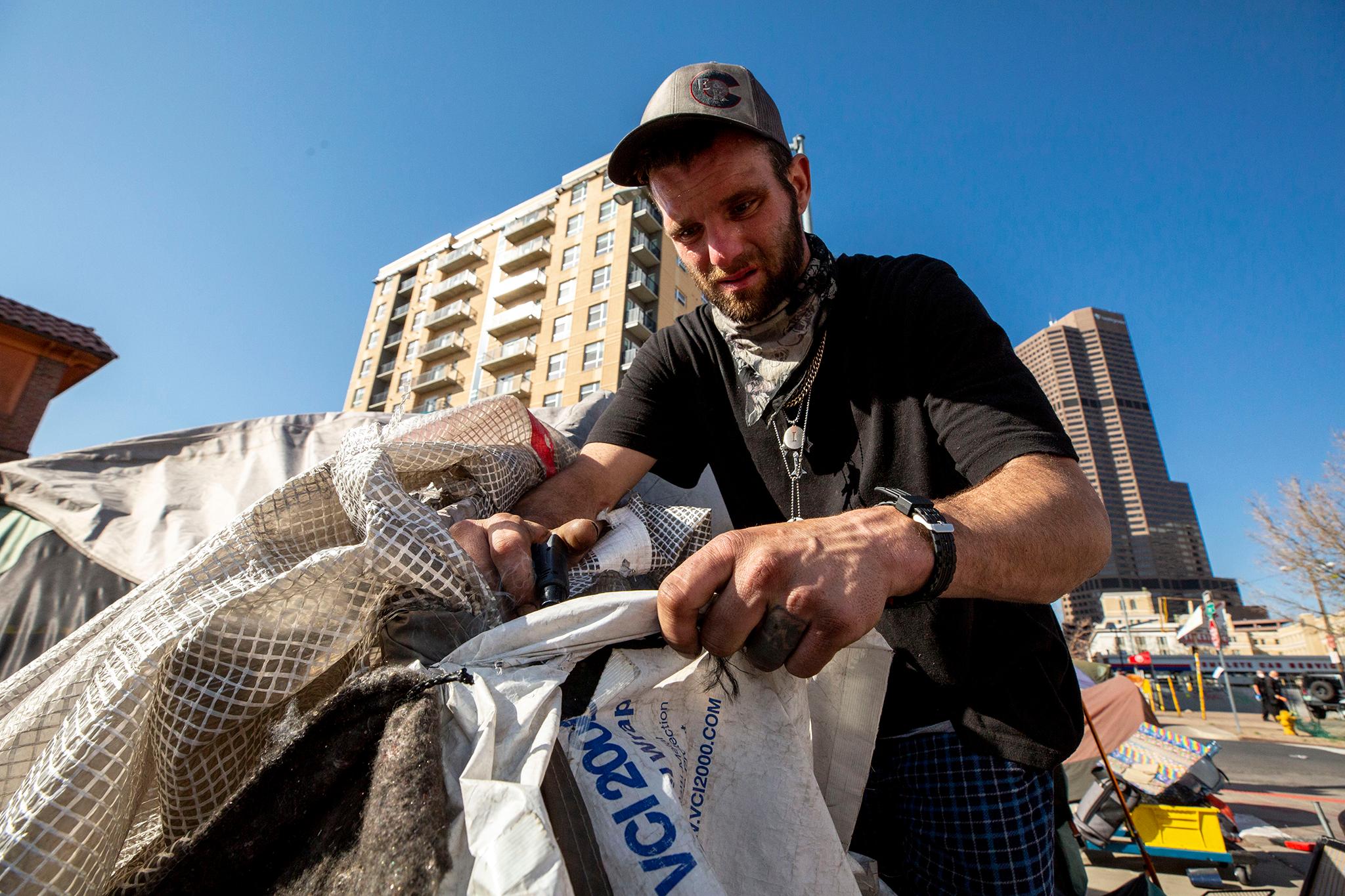
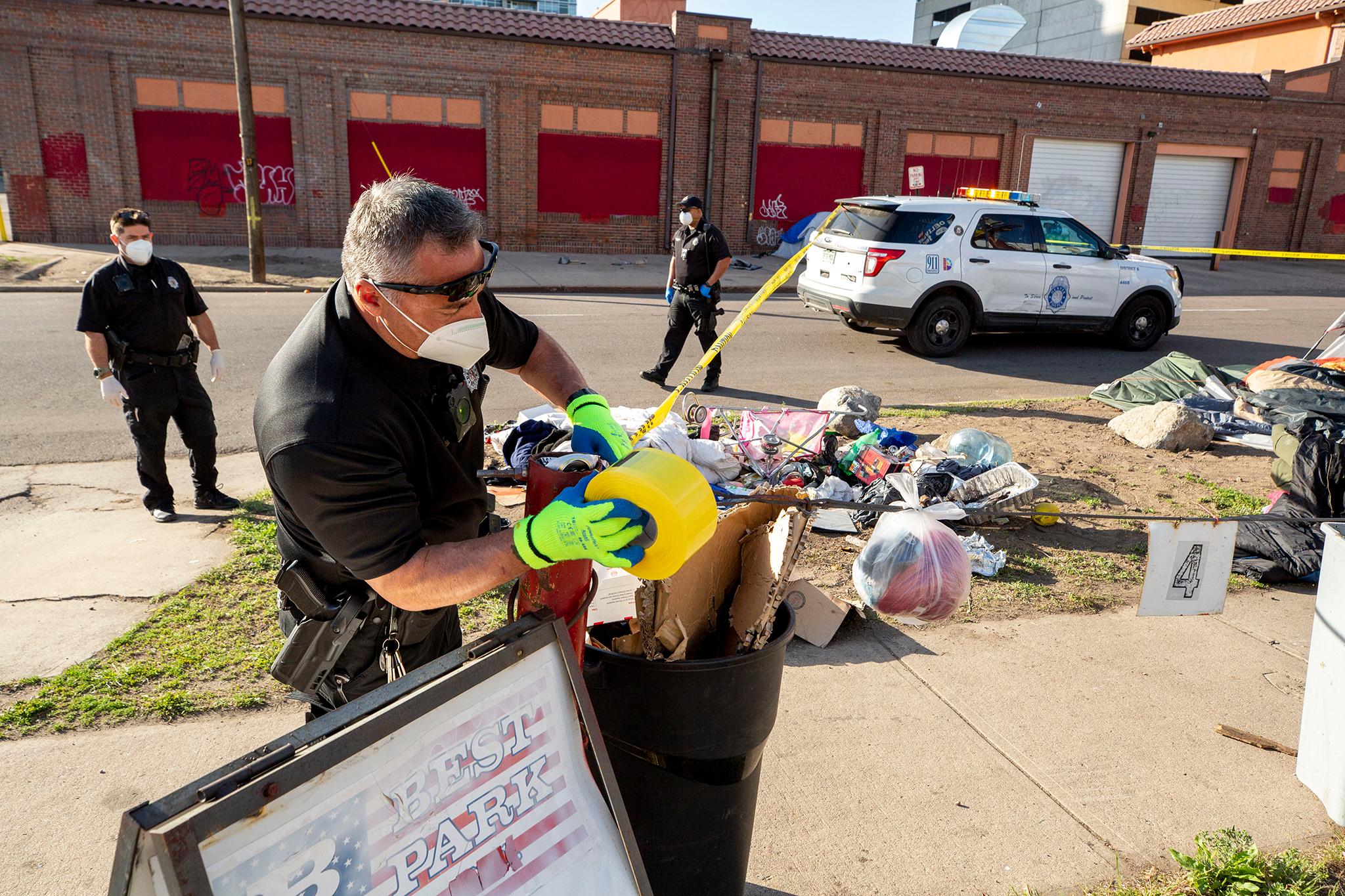
But Kuhn said in an email Thursday: "We're requiring that they move, temporarily, so that we can thoroughly clean. They can return."
Advocates say such cleanups could lead to people experiencing homelessness moving away from services they need amid the coronavirus outbreak. Five Points is home to day shelters and other services, including portable toilets.
Encampments can be crowded and lack access to places to clean up, conditions that make it difficult to stop the spread of the coronavirus. Because they often have other health concerns and their immune systems can be weakened by the stress of living on the streets, people experiencing homelessness are considered at greater risk of suffering the worst effects of COVID-19.
As of Thursday, according to city figures, 272 people experiencing homelessness had tested positive for COVID-19 in Denver. Four of those who tested positive have died. City spokeswoman Cyndi Karvaski said it is unclear if COVID-19 caused the four deaths.
Terese Howard of the advocacy group Denver Homeless Out Loud said 300 people were camping in the targeted area last week and 50 to 100 moved elsewhere following the initial cleanup.
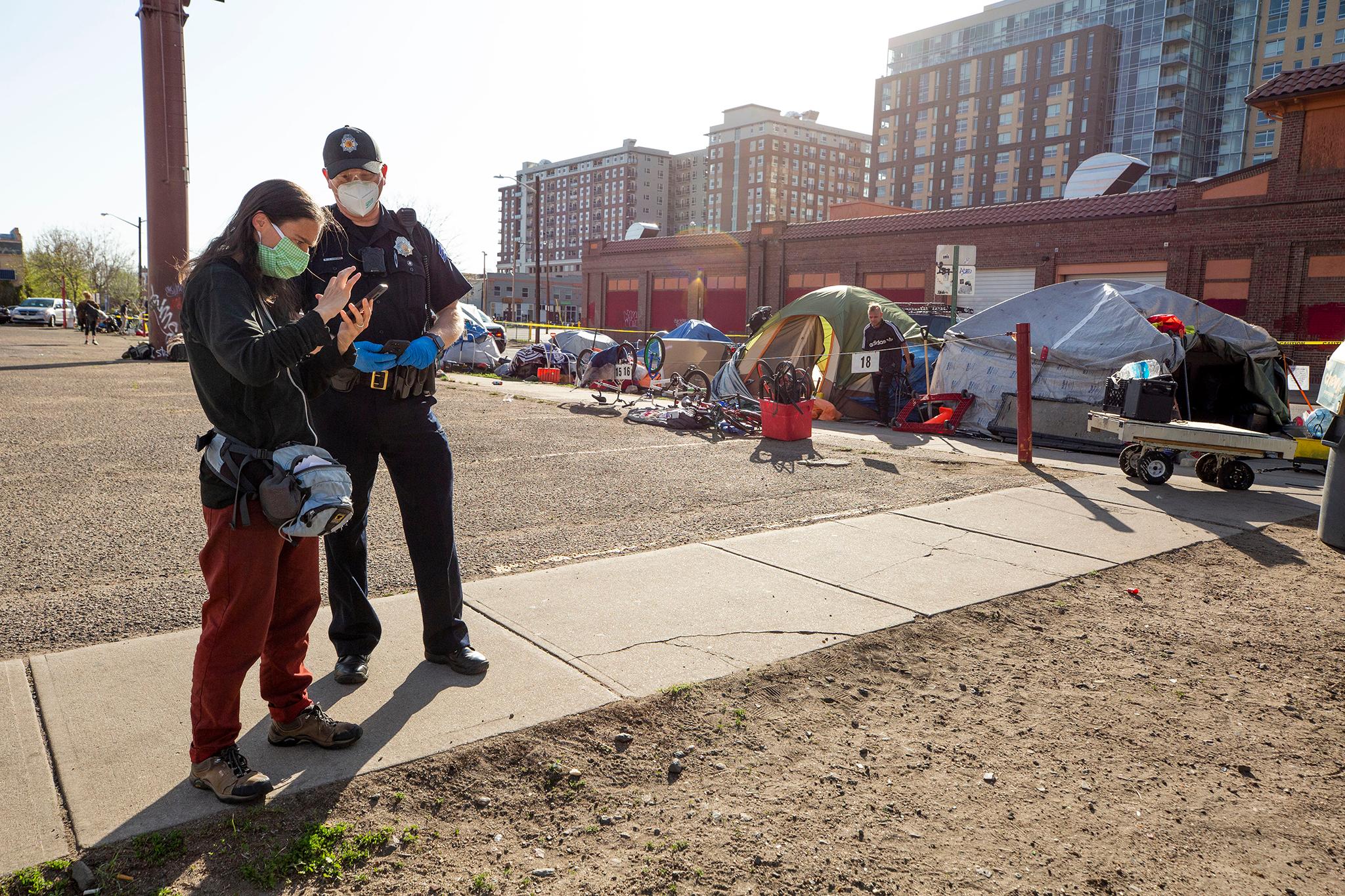
Chloe, who only gave us her first name, said she moved from one side of California Street to the other last week, and would do the same Thursday.
"What would help right now is for us to have housing. All those hotels, all those apartments are abandoned," she said, gesturing to the high rises of Denver's skyline.
Chloe said she had taken a look inside the Coliseum, where following the coronavirus outbreak the city established a shelter for women and people who identify as women. Chloe said the cots at the Coliseum were too close together and that other shelters had bed bugs.
Chloe said she had been rejected by her family and discriminated against by employers because she identified as "gender fluid." She said she felt safe and accepted by the community she had found on the streets.
Since the first coronavirus cases were confirmed in Denver, the city started working with the Denver Rescue Mission, Catholic Charities of Denver and other providers to open 24-hour shelters equipped with cots and portable showers at both the Coliseum and the nearby National Western Complex. The National Western shelter was designed to accommodate 600 men and has held more most nights since it was opened, an indication that people want shelter. The Coliseum has room for 300 women. Officials say both were designed to allow guests to practice social distancing.
Other shelters had to close so that staff could be consolidated at the new shelters, so the move did not add substantially to the city's shelter capacity. The city and its partners also have secured hundreds of hotel rooms for the most vulnerable among people experiencing homelessness during the coronavirus outbreak.
Faith-based groups and organizations that provide housing, health, employment and other services for people experiencing homelessness have proposed that in addition to the hotel rooms and new shelters, the city establish a sanctioned camping area with hygiene, sanitation and health services. Mayor Michael Hancock has long opposed sanctioned camping, saying the city must offer more permanent shelter.
According to the latest point in time survey, which gives a snapshot that is likely an under-count, about 4,000 people are experiencing homelessness in Denver on any given night.
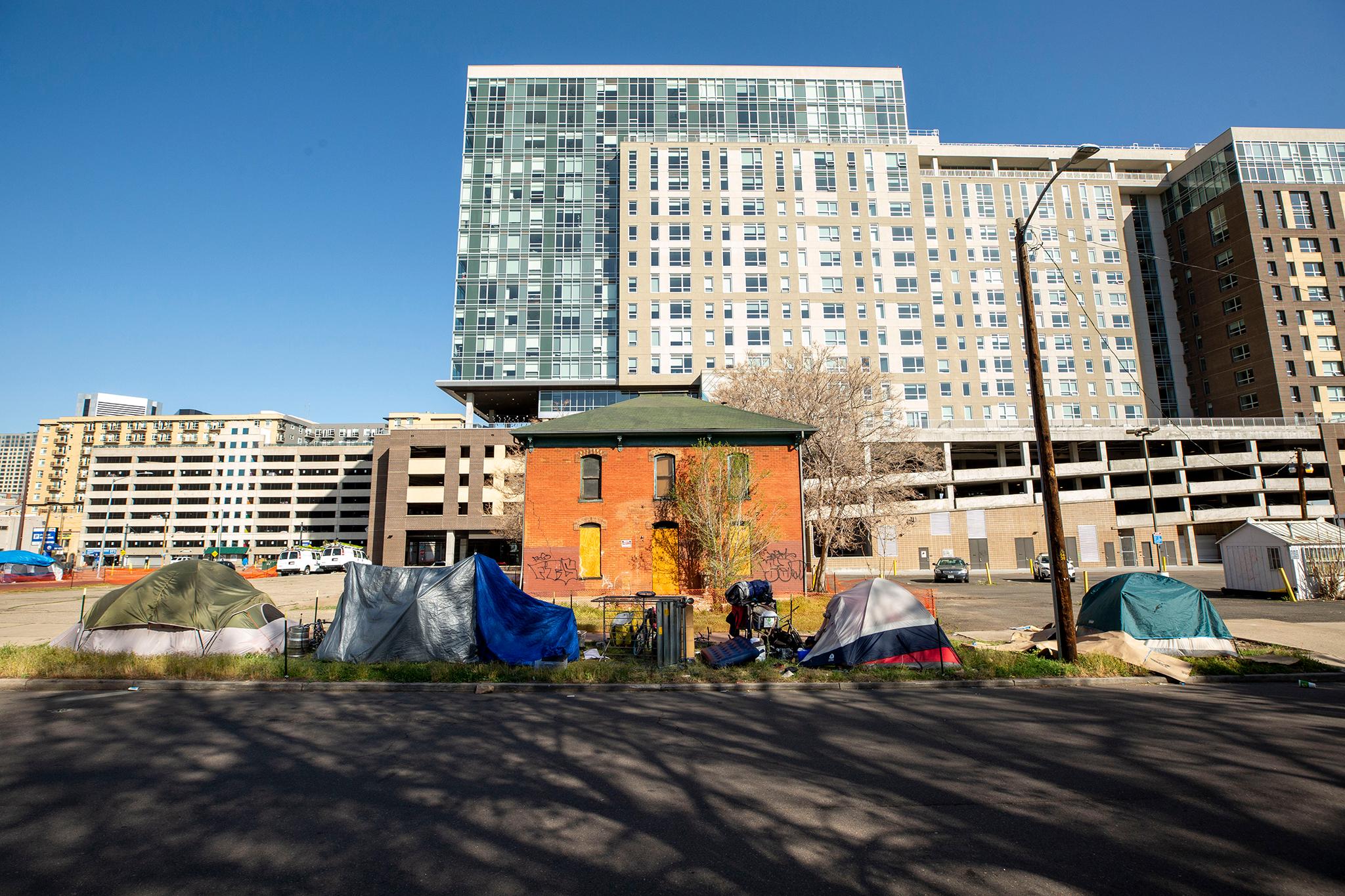
Nice described himself as "self sufficient." He keeps a plastic jug filled with water in his tent, which he had placed several yards from others.
"I'm constantly washing my hands," he said. "Being out here, you get dirty real, real quick."
He said his mother kicked him out of their Chicago home when he was 13. In the 14 years since, he said, he has earned a high school diploma and an associate's degree in computer-aided design and has overcome a heroin addiction.
"Not everybody you see out here is necessarily on drugs, on alcohol, a criminal or whatever," he said.
Nice said he gets by by accepting food handouts and scavenging or borrowing other necessities. He prefers his tent to a shelter and said he doesn't see the point in working to barely afford to rent a home.
"I won't work," he said. "It's not for me. I've tried it numerous times. I can't do it."
Danny Frantz lives on the 15th floor of the apartment building near where Nice had pitched his tent. Frantz, out with his wife Thursday walking their two dogs, said he has seen an increase in homelessness in the neighborhood, which he attributed to the job losses that have resulted from the impact of the coronavirus on the economy. Frantz said he and his wife give their unhoused neighbors water.
"I wish we could do more," he said.
Sam Tremble, who owns a Denver moving company, came to Five Points with a truck loaded with bottled water after a friend told him about the cleanup. Tremble said he had been wanting to see what he could do to help people experiencing homelessness, and a slowdown in business left him free Thursday.
Tremble said it was the first time he had seen a cleanup.
"It's painful to watch," he said. "I don't know how to solve the problem of homelessness. If they're not going to straight up arrest everybody and throw everything away, maybe they could err more on the side of listening to the people here."
Tremble used his truck to help some people move their belongings a few blocks.
A class action suit that was settled in federal court last year governs such cleanups. The plaintiffs had challenged the way city employees handled their belongings during some street cleanups in 2016. The settlement's provisions included requiring the city to give written notice before clearing away belongings. The settlement also called on the city to enact policies to ensure the return of property confiscated during clearances. The agreement does not limit the city's ability to act quickly in cases when public health and safety are threatened.
Police spokesman Jay Casillas said no one at the camp or related to the cleanup was arrested Thursday, but that a man on a bicycle struck a patrol vehicle in the area with a baseball bat. Casillas said the cyclist tried to ride away but hit a vehicle and was injured. He was arrested on a charge of damaging government property and taken to a hospital for evaluation. Casillas said the cyclist was not a part of the camps that were being cleaned.
